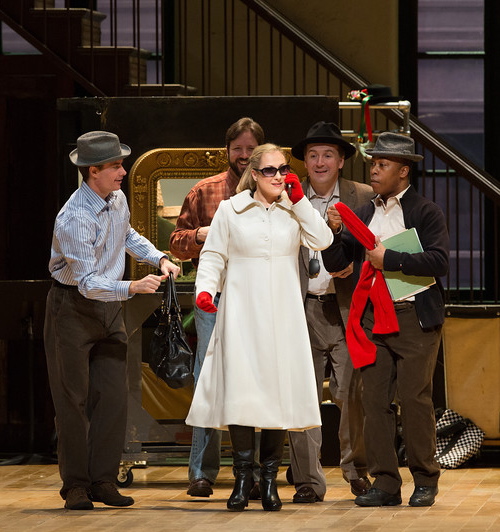Damrau rises above disastrous staging in Met’s narcoleptic “Sonnambula”
Bellini’s La Sonnambula is a goofy opera to begin with. The music is about as frilly as bel canto gets, and the plot isn’t exactly Faust in terms of its psychological, philosophical, or emotional depth. A young bride-to-be sleepwalks into a strange man’s bed, ultimately (and inadvertently) proving her innocence by sleepwalking again, this time onto a precipice in front of the entire village.
Comprehensibility, though, is a good baseline, and Mary Zimmerman’s 2009 “play-within-a-play” production, which returned to the Met on Friday, falls well short even of that. The conceit is that we’re watching a small-time opera company in its final days of rehearsal for a production of—wait for it—Vincenzo Bellini’s La Sonnambula. The leading couple are sleeping together, while the stage manager (Lisa, in the libretto), still hung up on Elvino, spends the entire opera throwing one constant fit of jealous rage.
For a staging with such a hyper-specific concept, a lot of the individual directorial choices seem overly general, leaving us scratching our heads trying to figure out what’s what. Those who already know the opera spend much of the time trying to puzzle out what’s supposed to be a “rehearsal” and what isn’t, while newcomers are likely left wondering what on earth is going on as the entire cast, consumed by sudden and inexplicable frenzy at the end of the first act, begin tearing things apart and throwing costume racks everywhere.
With Zimmerman’s staging bogged down in juvenile silliness, it’s up to the singers to carry the production, and, fortunately, they did just that Friday night. Diana Damrau came off as an endearing, reluctant diva in her portrayal of Amina, the show’s “leading lady” in this concept. Her start was rocky with the Act 1 aria “Come per me sereno” lacking her usual liquidity, and she had trouble reaching up to some of her high notes.
Still, she lost none of the sensitivity that makes her such an impressive artist. Damrau’s phrases were beautifully crafted, and she achieved dreamlike floating in her second sleepwalking sequence. She glided through a gorgeous “Ah non credea mirarti” with complete freedom, channeling palpable heartache into a tender but focused tone.
Singing his second role at the Met as Elvino, the Mexican tenor Javier Camarena had stretches of wandering pitch (mostly south). But he also had bright, searing tone, long, arching phrases, and dazzling high notes. A tender romantic when he had to be, Camarena was at his most gripping, both dramatically and vocally, in his moments of betrayed passion. He brought aggrieved rage to the lines of “Tutto è sciolto” and punctuated his excoriating condemnation of Amina with several high-octane B-naturals that would have woken anyone lulled to sleep by the staging.
Marco Armiliato had an uncharacteristically rough first act in the pit. The orchestra was on the verge of going off the rails in the “Viva Amina!” chorus, and much of his conducting was overly careful, dulling the sound and even slowing Damrau down in places. He recovered after intermission, finding the wit and sparkle of the piece, and summoning deep-toned warmth from the strings to accompany Elvino’s lamentations.
As Lisa, Rachelle Durkin had some occasional trouble with her coloratura, but mostly spun her phrases with ease, bringing a chirping brightness to the role. Unfortunately we didn’t get to see much of her acting chops, as the direction calls only for childish cattiness. She swooned and fanned herself in her interactions with Michele Pertusi, who brought his oaky voice and massive stage presence to the role of Rodolfo—here played not as a count, but as a veteran actor brought in as a ringer (apparently without the prior knowledge of anyone on the production team).
Elizabeth Bishop was winning as Teresa, Amina’s mother (and possibly, her costume designer), singing with plush, velvet sound. Jordan Bisch brought a beefy baritone voice to the role of Alessio, but was still earnest enough to pull off the doting sweetheart.
The chorus was in as fine voice, as ever, and they and Donald Palumbo earned a generous cheer at the curtain—rightly, since they bore a large portion of Zimmerman’s directorial nonsense, right down to the closing kick-line in Alpine-village dress.
La Sonnambula runs through April 1 at the Metropolitan Opera. metoperafamily.org

Posted Apr 02, 2014 at 7:36 pm by Juan Carlos Calderón
21st. Century Opera has become the work of childish
parricides, (Freud would be enchanted to have them
as patients)
Many of us opera lovers are resigned to enjoy the recorded music..
The less than full audiences at the Met are showing the results.